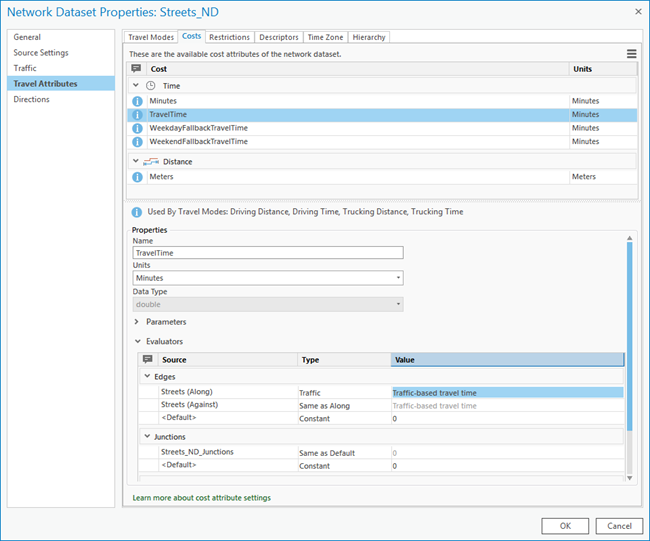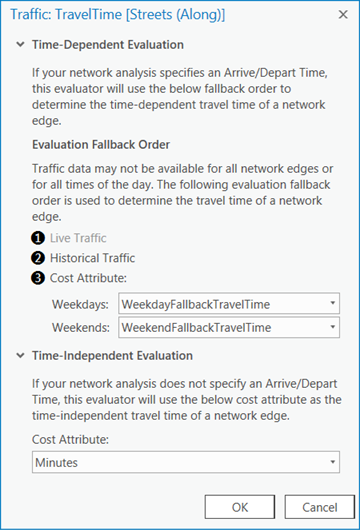Available with Network Analyst license.
To use traffic in your analysis, you need to have a time-based cost attribute that is configured with a traffic evaluator on the edge sources. Traffic is used when your analysis is using a travel mode that uses this cost attribute as its impedance, and your analysis specifies an arrive or a depart time.
The following screen shot shows a time-based cost attribute named TravelTime and a Traffic evaluator assigned to the Streets edge source. 
Click the Traffic Settings button in the evaluator's Value cell to open the traffic evaluator configuration dialog box. It shows how the traffic evaluator cost is determined.
If the analysis specifies the arrive or depart time, the TravelTime attribute will use time-dependent evaluation. The Time-Dependent Evaluation section shows the order in which Network Analyst will try to determine travel times. At first, it will use live traffic data if it's configured and DTF files are available for the given time and day and for a particular edge. If the search for live traffic is unsuccessful, the evaluator falls back to historical traffic and queries the Profiles Table and Streets-Profiles Table to find the profile that represents the segment's traffic on a given day of the week. If it finds a profile, it uses the multiplier (in the Profiles Table and the Free-flow travel time field or Free-flow travel speed field in the Streets-Profiles join table to calculate the historical travel time. However, if the segment doesn't have a profile for the given day, or the time queried is beyond the profile time range, the evaluator relies on the weekday or weekend fallback attribute to provide a travel time.
The fallback cost attribute in the Time-Dependent Evaluation section is split into weekdays and weekends to allow you to get day-of-week category dependent travel times when more specific traffic information is not available. You can choose to have both Weekdays and Weekends use the same cost attribute if you don't have weekday- and weekend-specific travel times; for example, both could point to the Minutes attribute.
The edge traffic evaluator also refers to a time-independent cost attribute. Time-independent in this case means the travel times of the network attribute don't change with time of day or day of the week. That is, the network element's travel time doesn't vary; it remains constant throughout the day and week. The edge traffic evaluator uses the time-independent attribute if the arrive or depart time isn't specified in the analysis The time-independent attribute is also used to sequence network locations in a route or vehicle routing problem analysis layer. The sequence of network locations is not optimized using traffic data; however, the routes between the network locations are. The time-independent evaluation cost attribute is Minutes in this example.
Configure a traffic-aware cost attribute
To configure a traffic-aware cost attribute, follow these steps:
- Access network attributes from the Network Dataset Properties dialog box.
- Click the Costs tab.
- Create a time-based cost attribute for time-independent evaluation if you don't already have one. Create two other time-based cost attributes for time-dependent fallback, weekday and weekend attribute, if necessary.
- Create a time-based cost attribute and make it traffic-aware by assigning the traffic evaluator type to its edge.
- From the Value cell, click the Traffic Settings button to open the traffic configuration dialog box for a traffic evaluator.
If live traffic is not configured, this option will be unavailable. You can hover the pointer over the option to see more information.
- Select the time-dependent cost attributes from the Weekdays and Weekends drop-down lists.
- Select the time-independent cost attribute from the Cost Attribute drop-down list.
- Click OK to save your traffic configuration.
- Click OK on the Network Dataset Properties dialog box to save the changes to the network dataset.
A traffic aware attribute returns the time-dependent cost to traverse an edge based on live or historical traffic data. For times or edges that do not have traffic data available, fallback cost attributes are used to return as accurate a value as possible. The edge traffic evaluator has properties to set its fallback attributes.
In the following step, you will create the traffic-aware cost attribute.